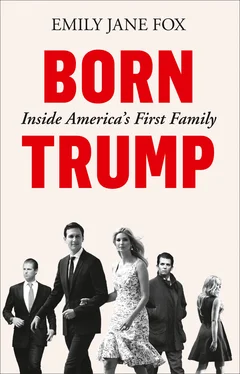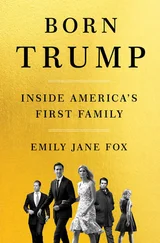Lewandowski interrupted him. Actually, they did have to rush this. The White House had already asked for the name of a transition head, and it was sure to come up at the meeting scheduled in a few weeks. They needed to decide this and get it out there already. Donald agreed with him. What was the point in waiting, anyway? The choice was made. Let’s get on with it.
Unlike Charlie Kushner, whose temper flashed and burned a whole room down in an instant, Jared simmered. The angrier he got, the quieter he became. So when he opened his mouth to respond, he was at little more than a whisper. It was rare for him to talk about his father’s stint in prison so openly, but on this day Jared unleashed. What came out was an impassioned monologue that went on so long that his father-in-law ultimately had to interrupt him. “It’s unfair,” Jared said. “He took advantage of my family members for his own ambition, and you don’t understand what he did to us.”
Christie, no shrinking violet, either, boiled in his seat. Before he could open his mouth, though, Donald jumped to his defense. “The guy was just doing his job. If you were there, you would have done the same thing,” he told his son-in-law. “You really should be mad at your own family here. They are the ones who turned over all that information to Chris.” Jared’s real problem, he added, was that he hadn’t known Donald at the time of his father’s trial; Donald and Christie were such good friends that things would have turned out differently. Christie would have taken it easier on his friend’s family. “No, no, no,” Christie interrupted. “I like you a lot, but I assure you it would not have been any different.”
“No, no, no,” Donald retorted. “It would have been different.” Donald then suggested that Jared, Charlie, Donald, and Christie go out to dinner together, to clear the air. Jared suggested that that might not be the best idea.
“Jared, you and I have talked about this,” Donald said soothingly. “Chris is the guy.”
“Fine,” Jared told him. “If that’s your decision, that’s your decision.” He turned around and walked out. Soon after, Lewandowski asked to be excused, too.
That afternoon the campaign sent out the release announcing Christie’s appointment. “Governor Christie is an extremely knowledgeable and loyal person with the tools and resources to put together an unparalleled Transition Team, one that will be prepared to take over the White House when we win in November. I am grateful to Governor Christie for his contributions to this movement,” Donald said in a statement.
ONCE THE decision was made, Donald and Jared called Charlie Kushner to let him know about Christie officially heading the transition, both asking for his blessing and making sure that it would not irreparably damage the in-laws’ relationship. It was a move out of respect and necessity, and one made with a great deal of anxiety. Charlie’s temper was a thing of legend in the tristate area. He would rip into anybody anywhere, burning his victims’ eardrums with the volume of his bellow.
Charlie played it cool when Donald called to let him know about the transition choice. He listened patiently to what his machatunim had to say. He took a breath. “Listen,” he said into the phone. “The most important thing is that you win and that you are prepared.” To those who heard the phone call, or how Donald and Jared recounted it, Charlie seemed genuinely magnanimous. Helpful and kind, even. The private father-son follow-up conversation went differently. Those close to the family recalled that Charlie told Jared they could let Christie do his thing now. This would get taken care of down the road. And indeed, six months later, just days after the election, Christie got canned from his gig, after months of working without pay, traveling to the transition offices in Washington every Wednesday, planning for the day when he would be able to execute on all the preparation he and his team had built up. Many believed the decision in large part stemmed from Jared, which they believed had been his plan from the get-go.
THE FIRST conversation between Jared and Christie about the transition role was not a walk in the park. It allayed no concerns over their ability to play nice as they worked to build one of the most complex, consuming, technical, and hugely vital aspects of a general election campaign, and prepare for a potential thereafter. So they talked it out. Don. Jr. was away from Trump Tower for the day they were due to meet during the summer of 2016, leaving his office on the twenty-fifth floor open. Jared asked Christie to meet him there. Across a round table, he admitted that he had not handled their last interaction as well as he had hoped to. He had reflected on it, he said, and come to the conclusion that the most important thing was that Donald win and be as well prepared to be president as he could be. He had put the past behind him, and he wanted them to work together throughout this whole thing.
Christie was skeptical. Just how past it could a guy who carried the wallet his dad made him while he was in prison really be? Christie himself had not totally put it behind him, particularly months later, long after Jared had a hand in firing him from his role, and reports of Jared’s meetings with Russian officials and involvement in the firing of FBI director James Comey caught the attention of investigators in the Robert Mueller probe. “Good thing I saved his father’s prison number,” Christie would joke with friends.
The two would be working together whether Jared and Christie had let it go or not. They were both professionals, who both wanted the transition planning to go smoothly. Neither wanted to spend their time sparring when there was so much daunting work to get done in short order.
A few factors made Christie’s eventual ouster a slick operation to pull off. Donald not only declined to be involved in the transition plans but also refused to hear about, read about, or talk about them. He had no clue whether Christie had done a good job getting everything together, whether the team he’d assembled knew their stuff, whether enough of the right materials were produced, and whether the policies and protocols and frameworks they spent months detailing jibed with how he would want to form his government after November 9. He could only rely on what other people he trusted—like, say, his children and their spouses—told him about the process.
Donald’s choice to stay removed from the transition had nothing to do with ethical concerns, time constraints, or a mental compartmentalization that pushed him to focus on only one goal at a time. He wanted nothing to do with transition talk because he thought it was “bad karma.” When he read in the papers or saw on the news any detail of the transition planning, he’d call his friends and staffers, screaming bloody murder. They would explain to him that, bad karma or not, they were complying with a federal law on the books since the 1960s that required a transition team for an orderly transfer of power between an outgoing and an incoming administration. If he didn’t want to have a hand in that, that was fine. But they couldn’t just not go forward with the whole thing.
Jared, by contrast, involved himself in the minutia. He ran a meeting every Monday on the twenty-sixth floor of Trump Tower, at which he, Christie, Jeff Sessions, and Rich Bagger, Christie’s former chief of staff, who he brought on to serve as the transition’s executive director, discussed staffing, policy priorities, and the various aspects of the planning. If for some reason they could not all meet in person, a conference call was set up. Rarely, if ever, did this check-in get canceled entirely. Jared reviewed the résumés and signed off on every staffer transition officials wanted to bring on, from secretaries up to national security and economic team members. All the vetting they were doing on potential Cabinet picks also needed his approval.
Читать дальше












